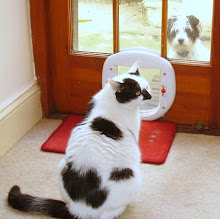This is why I'd buy Himself another boat, if I could.
When I first met him, my 56 year old husband slept on a wooden shelf in his workshop, surrounded by gardening machinery. His bed was a foam offcut, reached via a ladder, and he had a lamp for reading at night. It was April and bitterly cold, but he wasn’t fazed by such hardships. He’d spent much time at sea, so wasn’t used to creature comforts, and he needed to be near a phone because his mother was very ill. (This was before the days of mobiles.) Compared to his principle residence, the workshop had all mod cons: an outside toilet, phone, electricity, gas fire and even an electric frying pan.
His principal residence was White Heather, a one hundred year old wooden working boat (oyster fishing boat) moored on the river Fal in Cornwall. I spent most weekends on this 32 foot beauty getting to know one man and his boat, though much wooing took place in the nearby pub, a mere staggering distance from White Heather.
“I’ll teach you how to make toast,” my new man said one morning, “in return for sex.” An interesting chat up line, I thought, and one that I hadn’t heard before. (I ate a lot of toast from then on.)
Cooking aboard took place by means of a single gas ring lodged on a lump of cast iron ballast. The toaster was a piece of wire bent into a diamond shape and attached to a stick; anything else was cooked in sequence, in a variety of saucepans. For example, in order to cook curry (his favourite meal), he cooked the meat in one pan, then removed it from the heat with a plate on top to keep it warm while he cooked the rice. (Note who did the cooking.)
We slept on narrow bunks either side of a table he’d made from planks of old pine, and spent many an evening eating, drinking and arguing from the light of a tilley lamp. Next to the lamp stood a narrow silver vase, found at low tide in the thick mud below White Heather. By the time I arrived, every Friday evening, he had filled this vase with wild flowers.
Living aboard a boat with no heads (toilets to landlubbers) was something I soon got used to. The bucket and chuck it facility was used. This was a small price to pay for being woken by a blackbird, stamping his feet on deck, demanding breakfast.
“Look,” this man would say, pushing open the hatch to reveal a low mist lying on the river, a few swans and ducks sailing past serenely. “Boats bring you closer to nature, to life itself.”
“Living on a boat is being part of a living thing,” he continued. “It’s always moving, tugging at the tether, urging you to go. Who could say that about a house?”
One of the first difficulties I encountered living aboard was negotiating the gangplank. (This is more difficult when sober.) At high tide the long, ridged gangway would slope down onto the grassy bank and the water below lurked, dark and uninviting.
“It’s quite easy,” he would call from the safety of the deck. “Just don’t look down.”
But it was impossible not to, and I would take a deep breath and think of sailors walking to their death. At low tide the gangplank was a sheer walkway only negotiable by those with steel nerves or, as I discovered, by sitting on my bum and inching my way down. I was soon cured of such unseamanlike gestures and took to walking the plank like the rest of them.
I became so used to the constant rocking movement aboard that it wasn’t until I returned to my landlubber’s existence in the week that I realised its absence. When I lay in bed at night, only my head felt as if it were moving: the pillow stayed still. You either love or hate this feeling, but it can be quite comforting, provided the rocking is of manageable proportions.
A trip to the launderette proved expensive. The nearest laundry was at the marina in Falmouth, which just happens to have a bar. Of course we never had the right change for the washing machines, so we had to purchase a few drinks in order to get the correct money. Then we had to wait while the clothes were washed. Another round. A dash downstairs to sort washing and put it into the tumble dryers, and we had to wait another half hour. Whose round was it this time? And so on.
I soon met other people who lived afloat. An artist in the nearby yacht basin lived aboard a Dutch barge, furnished with incredible antiques. She had moved down from London to study at Falmouth College of Arts, and relished the peace and quiet of the creek. “The only problem is cabin fever,” she said. “You know – lack of space. I have to go out in the dinghy, row for hours and then I feel much better.”
Tristram Hollingsworth, who lives aboard a 40 foot gaff cutter in Gweek, had no regrets. “I moved from London ten years ago and have spent the last ten years afloat,” he said. “The transition of lifestyle must be experienced to be appreciated. You can feel a storm approaching, smell the rain and experience a warm front passing through. There is an abundance of wildlife; visiting swans looking for titbits, the shrill of seabirds on the ebbing tide, curlews at dawn and egrets in the evening. All these nuances of nature are lost to those ensconced behind concrete and double glazing.”
Boats also provide independence: the freedom to move around when and where you want. To many people, the concept of living in a house is too restricting, too claustrophobic. Why be tied down by rules and regulations, when you can cast off and be in France, the Isles of Scilly or indeed anywhere, in no time?
This is a fundamental issue for those who feel they are not meant to live on land. “Stop for a moment in a house and you hear nothing, feel nothing,” my husband says. “It’s a quiet reminder of our own mortality. But live on a boat and you experience life itself.”
First published in Classic Boat March 2007
Thursday, 28 June 2007
Subscribe to:
Post Comments (Atom)
















7 comments:
I thought I recognised this as one of your articles FP! It's very good, recapturing the sea life brilliantly! Do you miss life on the White Heather?
RT
What a wonderful tale, I could feel the swell!
Yes I do miss life on White Heather. Not that I'm a great sailor (after several unfortunate experiences, not with HImself I hasten to add) but living aboard is something very special. You do feel closer to nature in the best way!
Beautifully written. I could feel the sway of the boat and taste the salt in the air.
That was superbly written Flowerpot...I now know why you're a writer.
It brought back so many memories for me of life on the sea. Perhaps I'll share them one day?
many thanks for those comments. Having a week where I feel I can't string 2 words together, this has helped me a lot!
I love the idea of living on a boat for at least part of the time...
Post a Comment